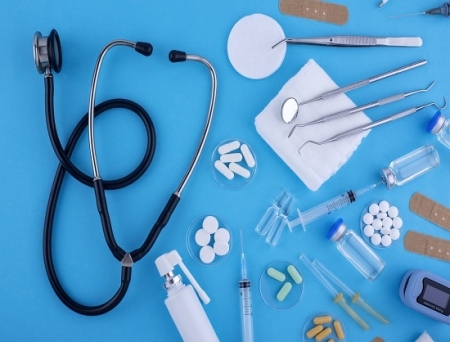GST Council Slashes Tax on Medical Devices, Lifesaving Drugs

The Goods and Services Tax (GST) Council, in its 56th meeting chaired by Union Finance and Corporate Affairs Minister Nirmala Sitharaman, has recommended sweeping changes in GST rates on medical devices, lifesaving drugs, and services, while also approving the operationalisation of the Goods and Services Tax Appellate Tribunal (GSTAT).
The Council has reduced GST on a wide range of medical apparatus and devices — used for medical, surgical, dental, or veterinary purposes as well as for physical or chemical analysis — from 18 percent to five percent. Medical equipment and appliances, including wadding, gauze, bandages, diagnostic kits and reagents, and blood glucose monitoring systems (glucometers) will now attract five percent GST, down from 12 percent.
In a major relief for patients, GST has been cut from five percent to zero on three critical lifesaving medicines — Agalsidase Beta, Imiglucerase, and Eptacog alfa (activated recombinant coagulation factor VIIa) — used in the treatment of cancer, rare diseases, and severe chronic conditions. Additionally, GST has been removed on 33 lifesaving drugs (12 percent to nil), while all other drugs and medicines will see their GST rate reduced from 12 percent to five percent.
The Council also approved a reduction in GST on biomedical waste treatment services, lowering it from 12 percent with input tax credit (ITC) to five percent with ITC. These changes will take effect from September 22, 2025.
The GST Council recommended operationalisation of the GST Appellate Tribunal, which will begin accepting appeals by the end of September 2025 and start hearings by December 2025.
The Council has also set June 30, 2026, as the deadline for filing backlog appeals.
The Principal Bench of the GSTAT will serve as the National Appellate Authority for Advance Ruling.
These measures are aimed at strengthening the institutional framework of GST by providing a robust mechanism for dispute resolution, ensuring consistency in advance rulings, and offering greater certainty to taxpayers. According to the Council, these steps will enhance trust, transparency, and ease of doing business under the GST regime.
Prime Minister Narendra Modi has expressed his happiness that the GST Council, comprising the Union and the States, has collectively agreed to the proposals submitted by the Union Government on GST rate cuts and reforms, which will benefit the common man, farmers, MSMEs, middle-class, women, and youth.
“The wide-ranging reforms will improve lives of our citizens and ensure ease of doing business for all, especially small traders and businesses,” he posted on X.
Changes in GST rates Goods and Services Tax (GST) Council Goods and Services Tax Appellate Tribunal (GSTAT) GST rates on medical devices Lifesaving medicines Medical apparatus and devices Medical equipment and appliances Union Finance and Corporate Affairs Minister Nirma
Last news about this category
We use our own and third party cookies to produce statistical information and show you personalized advertising by analyzing your browsing, according to our COOKIES POLICY. If you continue visiting our Site, you accept its use.
More information: Privacy Policy
















